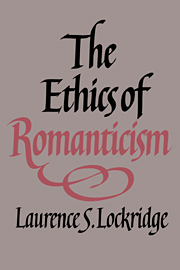3 - Blake: the poetry of violence
Published online by Cambridge University Press: 16 September 2009
Summary
Despite Blake's paradigmatic status, he is not a Platonic primary to whom all other Romantics are only footnotes. Shelley, for one, implicitly redresses a contradiction in Blake's poetry between the “right” and the “good,” and Coleridge, Hazlitt, and others revise and supplement him in basic ways. In constructing Blake's ethics, I will place him relative to other moral possibilities, and will suggest limits in his thought which must be seen, in keeping with his own attitude toward delineative outline, as both restricting and enabling. My aim is not to diminish a large and strange vision but to pursue the implications of his own moral dialectic to conclusions unsettling beyond the offense one hopes he still gives to the moral proprieties.
I accept the view that Blake is in a strict sense the leading Romantic “optimist.” For him, evil is accidental, not essential; imagination can ultimately triumph over negation and human freedom over constraint; history can be redeemed through apocalyptic release from cycles of repression and revolt. Blake's is the highest estimate of human power to be found in the period. But he images the quest for Edenic vision as so arduous, the end so frustratingly deferred, that in a deeply practical sense he does not distance himself so far from an ethics of radical fault after all.
- Type
- Chapter
- Information
- The Ethics of Romanticism , pp. 157 - 205Publisher: Cambridge University PressPrint publication year: 1989

